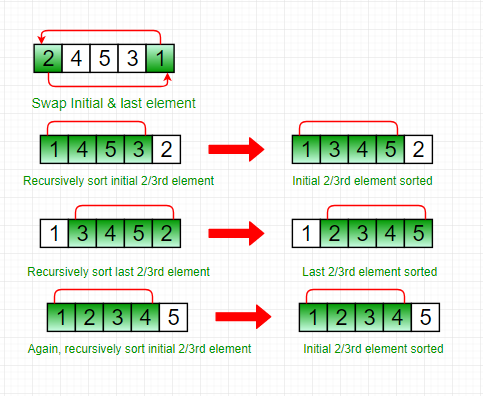Stooge排序是一种递归排序算法。定义如下(用于升序排序)。
Step 1 : If value at index 0 is greater than
value at last index, swap them.
Step 2: Recursively,
a) Stooge sort the initial 2/3rd of the array.
b) Stooge sort the last 2/3rd of the array.
c) Stooge sort the initial 2/3rd again to confirm.
注意:始终以((2/3)* N)的天花板来选择元素。
插图:
Input : 2 4 5 3 1
Output : 1 2 3 4 5
Explanation:
Initially, swap 2 and 1 following above step 1.
1 4 5 3 2
Now, recursively sort initial 2/3rd of the elements.
1 4 5 3 2
1 3 4 5 2
Then, recursively sort last 2/3rd of the elements.
1 3 4 5 2
1 2 3 4 5
Again, sort the initial 2/3rd of the elements to confirm final data is sorted.
1 2 3 4 5
C++
// C++ code to implement stooge sort
#include
using namespace std;
// Function to implement stooge sort
void stoogesort(int arr[], int l, int h)
{
if (l >= h)
return;
// If first element is smaller than last,
// swap them
if (arr[l] > arr[h])
swap(arr[l], arr[h]);
// If there are more than 2 elements in
// the array
if (h - l + 1 > 2) {
int t = (h - l + 1) / 3;
// Recursively sort first 2/3 elements
stoogesort(arr, l, h - t);
// Recursively sort last 2/3 elements
stoogesort(arr, l + t, h);
// Recursively sort first 2/3 elements
// again to confirm
stoogesort(arr, l, h - t);
}
}
// Driver Code
int main()
{
int arr[] = { 2, 4, 5, 3, 1 };
int n = sizeof(arr) / sizeof(arr[0]);
// Calling Stooge Sort function to sort
// the array
stoogesort(arr, 0, n - 1);
// Display the sorted array
for (int i = 0; i < n; i++)
cout << arr[i] << " ";
return 0;
} Java
// Java program to implement stooge sort
import java.io.*;
public class stooge {
// Function to implement stooge sort
static void stoogesort(int arr[], int l, int h)
{
if (l >= h)
return;
// If first element is smaller
// than last, swap them
if (arr[l] > arr[h]) {
int t = arr[l];
arr[l] = arr[h];
arr[h] = t;
}
// If there are more than 2 elements in
// the array
if (h - l + 1 > 2) {
int t = (h - l + 1) / 3;
// Recursively sort first 2/3 elements
stoogesort(arr, l, h - t);
// Recursively sort last 2/3 elements
stoogesort(arr, l + t, h);
// Recursively sort first 2/3 elements
// again to confirm
stoogesort(arr, l, h - t);
}
}
// Driver Code
public static void main(String args[])
{
int arr[] = { 2, 4, 5, 3, 1 };
int n = arr.length;
stoogesort(arr, 0, n - 1);
for (int i = 0; i < n; i++)
System.out.print(arr[i] + " ");
}
}
// Code Contributed by Mohit Gupta_OMG <(0_o)>Python3
# Python program to implement stooge sort
def stoogesort(arr, l, h):
if l >= h:
return
# If first element is smaller
# than last, swap them
if arr[l]>arr[h]:
t = arr[l]
arr[l] = arr[h]
arr[h] = t
# If there are more than 2 elements in
# the array
if h-l + 1 > 2:
t = (int)((h-l + 1)/3)
# Recursively sort first 2 / 3 elements
stoogesort(arr, l, (h-t))
# Recursively sort last 2 / 3 elements
stoogesort(arr, l + t, (h))
# Recursively sort first 2 / 3 elements
# again to confirm
stoogesort(arr, l, (h-t))
# deriver
arr = [2, 4, 5, 3, 1]
n = len(arr)
stoogesort(arr, 0, n-1)
for i in range(0, n):
print(arr[i], end = ' ')
# Code Contributed by Mohit Gupta_OMG <(0_o)>C#
// C# program to implement stooge sort
using System;
class GFG {
// Function to implement stooge sort
static void stoogesort(int[] arr,
int l, int h)
{
if (l >= h)
return;
// If first element is smaller
// than last, swap them
if (arr[l] > arr[h]) {
int t = arr[l];
arr[l] = arr[h];
arr[h] = t;
}
// If there are more than 2
// elements in the array
if (h - l + 1 > 2) {
int t = (h - l + 1) / 3;
// Recursively sort first
// 2/3 elements
stoogesort(arr, l, h - t);
// Recursively sort last
// 2/3 elements
stoogesort(arr, l + t, h);
// Recursively sort first
// 2/3 elements again to
// confirm
stoogesort(arr, l, h - t);
}
}
// Driver Code
public static void Main()
{
int[] arr = { 2, 4, 5, 3, 1 };
int n = arr.Length;
// Calling Stooge Sort function
// to sort the array
stoogesort(arr, 0, n - 1);
// Display the sorted array
for (int i = 0; i < n; i++)
Console.Write(arr[i] + " ");
}
}
// This code is contributed by Sam007.输出:
1 2 3 4 5
stooge sort的运行时间复杂度可以写成:
T(n)= 3T(3n / 2)+?(1)
上述重复的解决方案是O(n (log3 / log1.5) )= O(n 2.709 ),因此它比偶数冒泡排序(n ^ 2)都要慢。
参考:
维基百科